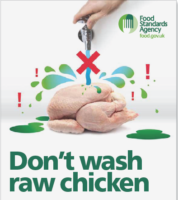UK Food Standards Agency CEO Discusses Campylobacter Control Plan
BBC News today reported that the UK's Food Standards Agency (FSA) has launched a strategy aimed at reducing the number of illnesses from Britain's most common cause of food poisoning — campylobacter.
The Agency said it would improve information about levels of campylobacter in the supply chain. The bacterium is linked to about 460,000 poisoning cases, 22,000 hospital admissions and 110 deaths each year in the UK, with a significant proportion of cases involving campylobacter come from poultry.
FSA chief executive Catherine Brown said she wanted to see a "shift in culture" in the food industry. In an interview on Radio 4's Today program, Brown said that in practice, FSA's new strategy will include measures such as improving biosecurity on farms to prevent campylobacter from infecting chickens, improving production facilities, expanding testing, and improving packaging and advice to consumers.
"Yes, farmers need to work really hard on improving biosecurity, but, just as much, I would say that producers, slaughterhouses and retailers have a really important role to play," she said.
The new strategy was on the agenda for today's FSA board meeting in Aberdeen, Scotland. The meeting will be available as a podcast within 48 hours, according to the FSA website.
An FSA survey five years ago suggested that 65 percent of chicken on sale in shops was contaminated with the bacteria. Monitoring by the FSA suggests there has been no change in the proportion of the most highly contaminated chickens since 2008. The FSA said it would ensure that food businesses using chilled chicken were aware of the risks.
Research programs into vaccination and other long-term measures would be supported by the agency. The FSA would also use regulation if necessary to change behavior in the industry, officials said.
"What we have proposed in this paper is a shift in culture and a refocusing of effort by both government and the food industry to tackle this persistent and serious problem," Brown explained. "While we remain committed to joint working with industry we want to encourage and see producers, processors and retailers treat campylobacter reduction not simply as a technical issue but as a core business priority, and I see some encouraging signs of that happening."
Earlier this year, a BBC investigation revealed that cases of campylobacter infection were increasing. The British Poultry Council (BPC) said at the time it was doing everything it could to reduce the risk of infection.
On Wednesday, the council's chief executive, Andrew Large, told BBC Breakfast that the council, the FSA and retailers had formed a joint working group on campylobacter. "There are a lot of interventions that are currently being trialled," he added.
Looking for a reprint of this article?
From high-res PDFs to custom plaques, order your copy today!





